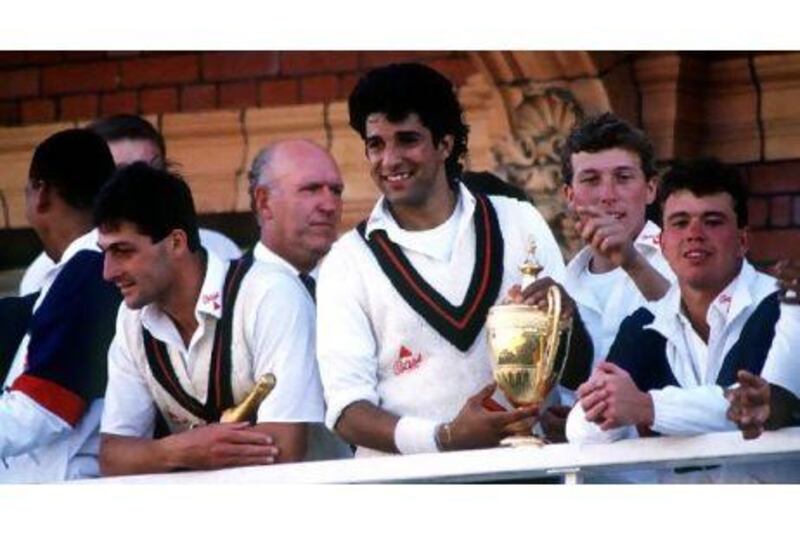The English county game has a unique place in cricket folklore. At the heart of this lies its position as the birthplace of the sport; participation in English domestic cricket, be it county or the local club, undoubtedly goes beyond honing cricketing skills and to a deeper nostalgia.
Over the many decades, it has remained the most welcoming of competitions for foreigners and as a result has drawn some of the greatest talent the world over, developing players' skills and application in the unique playing conditions.
Pakistani cricketers, ever since Abdul Hafeez Kardar, Pakistan's first Test captain and the man who was the first Pakistani to venture into county cricket, gave to the English game a mercurial brilliance that brought with it a sense of thrill and uncertainty.
How fortunate Lancashire fans were to be able to view the magical Wasim Akram playing for their local team, or those spectators who had the opportunity to view Waqar Younis leading the charge.
The support was repaid by the players, who were fully committed to their county's cause. Waqar took 114 championship wickets at 14.36 in 1991 and played a few seasons for the same club. Akram still owns a home in the area and was the one who recommended Junaid Khan to Lancashire for the 2011 Friends Life T20.
After spending many years living and sharing in their county's success, it's no surprise that local fans began adoring them as one of their own; some later settled in England.
In addition to exhibiting their own mastery of the game, Pakistanis have helped pass on skills and knowledge to English players - skills that would manifest themselves in the years to come.
It came as no surprise that we witnessed Wasim Akram's former county Lancashire teammate Andrew Flintoff reverse-swinging England to victory in the wonderful 2005 Ashes series.
Darren Gough, England's most successful one-day international bowler, has acknowledged that he was inspired by Waqar's yorker. Mushtaq Ahmed's value to English cricket was so appreciated that he has now become a bowling coach for England's team, playing a leading hand in making Graeme Swann a world-class spinner.
It has not been a one-way street; Pakistani cricketers have gained much from the experience.
In comparison to the Pakistani domestic competitions, county cricket gave the players a chance to showcase their skills with little worry about nepotism or infighting. The relaxed body language of the players currently playing in the 2011 Friends Life T20 competition is in stark contrast to the difficulties faced at international level.
It's a structured and well-organised competition where players concentrate on the finer important points in the game, as those who witnessed Junaid Khan bowl six yorkers in succession to pull out an improbable victory for Lancashire will testify after witnessing this uniquely Pakistani skill.
The financial benefits to both parties should not be overlooked, either.
Pakistani players do not participate in the Indian Premier League, but the counties pay well and go some way to reimbursing players for such exclusion. Such mutual benefit will enhance the relationship between club and Pakistanis at a time when the absence of domestic international cricket can make the players feel isolated and exposed to the whims of peoples unknown.
Playing abroad also taught the players discipline and an opportunity to live in a different culture - an understanding that becomes infinitely more important when considered alongside England potentially further staging home series for the international side.
County cricket helped craft Pakistan's golden generation that achieved success both at home and abroad. Javed Miandad claims that were it not for England the charismatic Imran Khan would not have become the cricketer that he did and Imran himself acknowledges the impact.
In the 1990s, rules were put in place to reduce the influx of internationals so as to open a way for rising young English players. Hence, it's a breath of fresh air to see Pakistanis cricketers once again making a colossal impact on the cricket field in a premier English domestic competition. The performances of Pakistani players in the 2011 Friends Life T20 competition have certainly caught the public's imagination.
The top three international T20 wicket-takers are Pakistanis and it's no surprise that all three have been sought to participate: Shahid Afridi at Hampshire, Umar Gul at Sussex and Saeed Ajmal at Worcestershire.
Rising players such as Wahab Riaz and Junaid Khan have proved a huge hit, while the seasoned campaigners such as Azhar Mahmood, Abdul Razzaq and Rana Naved have been key to their counties' success.
The players' ability to contribute with both bat and ball is invaluable to county teams, who are wary of risking scarce resources on pure batsmen whose contribution to a game could be brief, if out early.
The immense value of Pakistani cricketers, particularly in the shortest and most commercially viable format, is clearly evident for all to see.
The Australian Big Bash and Sri Lankan Premier League have also been competing to acquire the best Pakistani talent. It is therefore a sad notion that the upcoming T20 Champions League, which consists of the best clubs from around the world, will not feature any Pakistani teams.
For now, as we head into the finals of the Friends Life T20, the stage is set for a flamboyant Pakistani to yet again leave an unforgettable mark on county cricket.
Follow
The National Sport
on
[ @SprtNationalUAE ]





